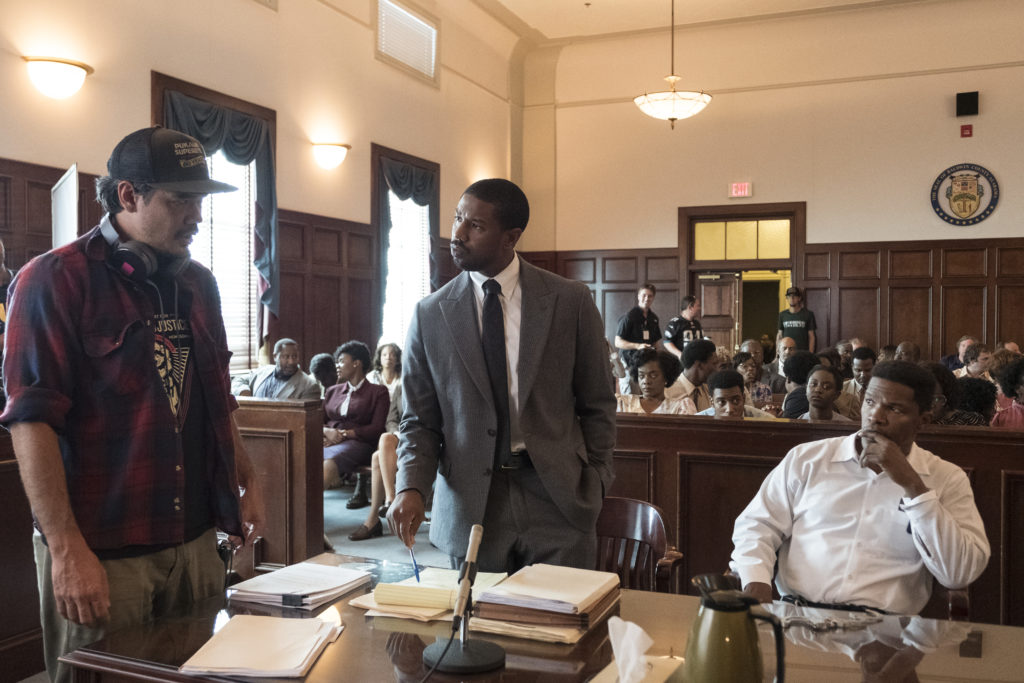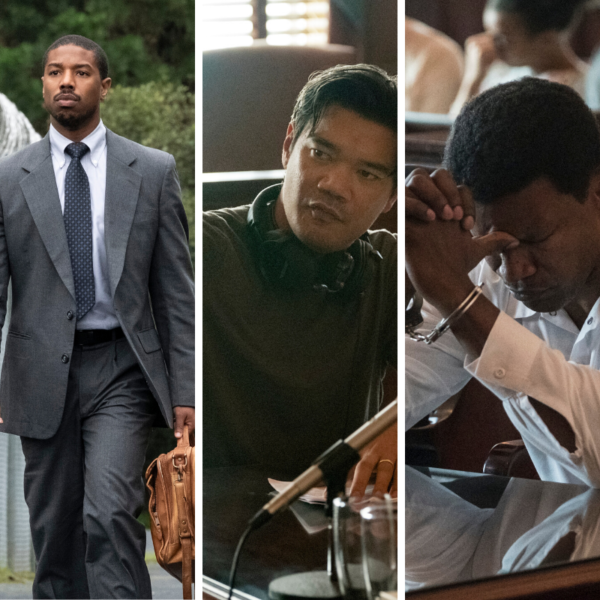Out in limited release on Christmas Day before nationwide expansion on January 10, Warner Bros.’ Just Mercy tells the timely tale of criminal justice gone awry. Specifically, the film follows civil rights defense attorney Bryan Stevenson—who wrote the memoir on which Just Mercy is based—as he travels from Harvard to the Deep South to defend the wrongly imprisoned. There he meets Walter McMillian, on death row for years following a conviction for murdering a young woman. McMillian has an airtight alibi, and the prosecutor’s main witness isn’t exactly trustworthy. But McMillian is black, the murdered girl was white, and the cops just wanted to put someone behind bars. This is, after all, Alabama—the very county in Alabama where Harper Lee’s To Kill a Mockingbird is set. How’s that for irony?
Bringing this true-life tale to the screen with sensitivity and power is Destin Daniel Cretton, reuniting with his Short Term 12 co-star Brie Larson, playing Stevenson’s colleague at the nonprofit Equal Justice Initiative. Delivering powerhouse performances are Michael B. Jordan (who also produced) as Stevenson and Jamie Foxx as McMillian, the latter burning up the screen in every scene he’s in. In advance of the film’s limited release, Cretton took the time to speak about his latest project.
How did you come to be involved in this project?
[Just Mercy] was a book that was handed to me by our producer, Gil Netter, to see if it was something that I might be interested in. By the time I finished reading the last page, I was so deeply, deeply moved by not only the subject matter, but by the beautiful, multidimensional characters. It was something that I knew I had to be a part of.
When you were doing that initial read, were you already thinking of it in terms of a movie?
You know you’re reading a really good piece of writing when you disappear into it, and your brain turns off and you’re transported to another place. And that’s how I felt reading Just Mercy. I wasn’t analyzing it to see if it was a great movie or not, because it moved me so much.
Was there one aspect of the book that really hooked you?
Bryan talks, particularly toward the end of the book, about hope. He says that hopelessness is the enemy of justice. Without hope, we are not able to attempt to do the things that seem impossible. That was something that really spoke to me [when it came to] taking on a project like this. It’s what I hope some people take from watching this movie. Even though we are living in a time right now when problems seem so big and impossible to fix, I think Bryan Stevenson’s life and work show us that the simple decision of seeing a problem and deciding to do something about it can have results.
I appreciate that the film is hopeful without being overly melodramatic, which is a trap that legal dramas can sometimes fall into.
We were definitely trying to walk the tightrope of representing Bryan’s story in a truthful way without the filmmaking pushing too hard. The true story is mapped out like it is in the movie. Everything that happened, happened. The emotions are extremely high and extremely low. The moment that Walter McMillian was released, the way it’s described in the book, it’s an extremely emotional moment. It was definitely a challenge to find [a tone] that doesn’t shy away from the high emotions that Bryan and these people went through, but also doesn’t feel manipulative to an audience so they can actually participate in those emotions in a more real way.

Just Mercy takes place in Monroe County, Alabama, which is where To Kill a Mockingbird is set. If Just Mercy were a novel, I would almost think that’s too on the nose. But Walter McMillian’s trial really did happen there.
I think it would be a disservice to the movie not to mention it. But yeah, anytime we delved too much into the To Kill a Mockingbird comparison, it definitely started to feel a bit too much. But we hoped a little sprinkling of it lets people understand the irony that Bryan Stevenson was feeling throughout the entire process.
You were born in Hawaii and moved to California. Just Mercy is set, not just in the South, but in the Deep South—which is a very distinct place culturally and certainly has a very specific history when it comes to institutional racism. How did you get into that Southern mindset?
It’s no secret that I stepped into this project as an outsider. But reading Bryan’s book, it became very clear that this story wasn’t only about what’s going on in Alabama. This story felt extremely connected to me.
Bryan starts Just Mercy by saying that you can’t fully understand the problem unless you allow yourself to get really close to it. My personal journey on this project was, honestly, starting from a place of fear and inadequacy. “Who am I to tell this story?” But I had Bryan Stevenson by my side, with my co-writer, Andrew Lanham. We were very close with Bryan throughout the entire writing process. There was no way I would tell this story if that wasn’t the case. Being able to go and visit the places that he talks about in the book and meet people like Anthony Ray Hinton [played by O’Shea Jackson Jr.], who was on death row and in Holman Prison at the same time as Walter McMillian. Being able to, step by step, get closer and closer to this subject was one of the most impactful, eye-opening experiences of my life.
It rang true that the characters who were touting their town’s To Kill a Mockingbird connection were the ones not interested in helping Bryan Stevenson. You see a lot of overt racism in the film, but there’s also stuff that bubbles under the surface.
One thing that is very true when you speak to Bryan Stevenson or talk to anyone who’s doing the type of work he’s doing is that the racism is extremely real. And honestly, we could have pushed those characters into extremes far beyond what we do in the movie, and it would still be real. The flip side is that there are also many Southerners like Eva Ansley [played by Brie Larson], who are fighting for those who are the most vulnerable, whether they are black or white. There are extremely loving, kind, open-minded people all throughout the South. That’s the thing that really gives me hope.

There are a lot of movies about racism in the South in which people are doing overtly racist things, like waving around Confederate flags. And that’s accurate. People still do that. But you run the risk of people seeing those movies and thinking, “Well, I’d never do something like that. So I’m not the problem.” And then they don’t have go through the uncomfortable process of examining their biases.
I think one of the scary realizations about watching a movie like this is the moment when you think, “Oh, if I saw that mug shot of Walter McMillian and the news broadcast that they finally caught the killer of this young, white girl, I probably would not have thought twice about it at that time.” I hope this movie and movies like this make all of us think twice. Every time we see a mug shot and a little blurb, “They caught the guy!” I hope we don’t go immediately to the sense of relief. And we start to question it.
There’s a horrible narrative whenever there’s an instance of police brutality, and people start to examine the victim’s character. Walter McMillian wasn’t a perfect person, but he doesn’t need to be faultless and saintly for his story to be seen as a miscarriage of justice.
Yeah, 100 percent. Bryan Stevenson says there are no rich people on death row. He says that our system treats you better if you are rich and guilty than if you are poor and innocent. And you definitely see that play out in this movie. You see how the poor and vulnerable are taken advantage of by a system that can easily sweep them under the rug or put them on death row because it benefits them. And it’s also interesting to see the way that Tim Blake Nelson’s character, Ralph Myers, gets wrapped up in it and is used as a tool by the people in power to get what they want. [Myers, a career criminal from an impoverished background, was pressured by law enforcement officers to offer a false testimony against McMillian.]
How did Michael B. Jordan come to be involved in the film?
Michael B. was the first person who came on. He was the first person we attached, even before we started writing the script. We sent the book to him, and he was passionate about the project from the start. So he came on both as an actor and as a producer very early in the project.
He’s perfect for the role.
Bryan Stevenson is one of the most compassionate, empathetic people I’ve ever met. And he’s also one of the smartest and most strategic people I’ve ever met. I do think that Michael B. Jordan shares a lot of those same qualities. In order to do the types of performances that Michael B. does, it’s all about his ability to empathize with the characters he’s playing. He is able to connect with Bryan Stevenson on so many levels. It was exciting to watch him do that.



Share this post